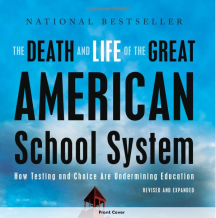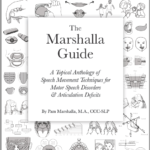The School Speech Therapist Book Review

The Death and Life of the Great American School System
Book Review
I’m almost finished listening to the book The Death and Life of the Great American School System by Diane Ravitch. All I can say is no wonder the United States finds it’s self in a quandary about what to do to improve all schools. Ms. Ravitch is an Educational Historian who speaks from experience, significant research and some first hand observation. Her book goes back several decades and chronicles the many many attempts to improve schools. It is amazing how many methods have been tried and I might add failed. Reformers, educators (those involved in school reform), administrators and even statisticians have made education so complicated and convoluted over the years it’s no wonder that most reform attempts fail.
While reading this book I get the sense that most reformers have no understanding of children, how they learn, how challenging other aspects of their lives can be or even human nature. Most reform measures seem very myopic in their goals and never look down the road as to the child’s ability to apply learning to life. Reform ideas seem to appear willy nilly without research, studies, development or revision. If a reform idea doesn’t work after awhile one of two things seem to happen, they move on to another reform or the players move on and the original reform fades away. I’ve actually worked in districts who have jumped from reform idea to reform idea. What I noticed in these schools are students with glaring splinter skills and a general lack of maturity in their academic abilities and confidence.
What is most interesting about this book is that Ms. Ravitch was originally a supporter of reform until she realized most of reforms didn’t worked, reform promoted cheating, the goals set were impossible and that state mandated testing produced little reliable data. Ms. Ravitch, also points out that much of the blame, when reforms fail to produce improved test scores falls on to the teachers and principals. She sites several reasons why the sole blame should not fall on teachers and principals alone. My impression is that school reformers claim to fame is to place the blame on teachers and unions when their ideas don’t work. I found it very curious that even most recent reform ideas don’t seem to mention much about developing a good strong curriculum for teachers to work from. I would think that would be the biggest part of the whole equation.
This is a long complicated book and much of the time the information just blended together. This isn’t to fault Ms. Ravitch’s writing, it just emphasizes how disorganized school reform is. Her book makes hundreds of valid points around the mistakes made in reforming education. It is a fabulous book for discussion points. The Death and Life of the American School System details the history of education across the nation not just what has happened in your school district or state. I think most readers will be surprised at some of the absurd situations and ideas that have developed over the years in education. There also appears to be a general lack of ownership and clear documentation when reform ideas fail.
Teacher’s are almost powerless in fighting school reform and their opinions and experience is rarely (if ever) solicited. For years, I’ve wondered why school administrators, superintendents and even school boards don’t question reforms being forced on school systems. Especially systems that have high functioning schools. Struggling schools tend to go through these reform programs quickly, dumping them when they can’t report an immediate success rather than tweaking them to fit their needs. Frequently, I see and hear about school districts spinning what they know are going to be ineffective approaches, to parents and the media, always touting that they’re implementing the next great thing in education.
Everyone wants to see the data. Ms. Ravitch points out that data doesn’t show everything and that often the wrong data is collected and compared. I know that there have been programs introduced in schools that have been widely used for years. I’ve asked the consultants of these programs to show me the data and they usually can’t. I believe it’s because there isn’t any. Yet when presenting to a group, consultants will always say, “The data shows….” I learned a long time ago, from one of my grad school professors in fact, to question educational data.
So pick up this book read, listen and highlight. Learning the history of reform, lack of organization and lack of success made me realize that I am not the only one who is concerned that education has taken a wrong turn. This book should be required reading for every school committee member, administrator, superintendent, mayor, town counsel, finance committees and anyone else who has responsibility for planning children’s education.








Interested in learning more. Follow Diane Ravitch’s Blog
http://dianeravitch.net